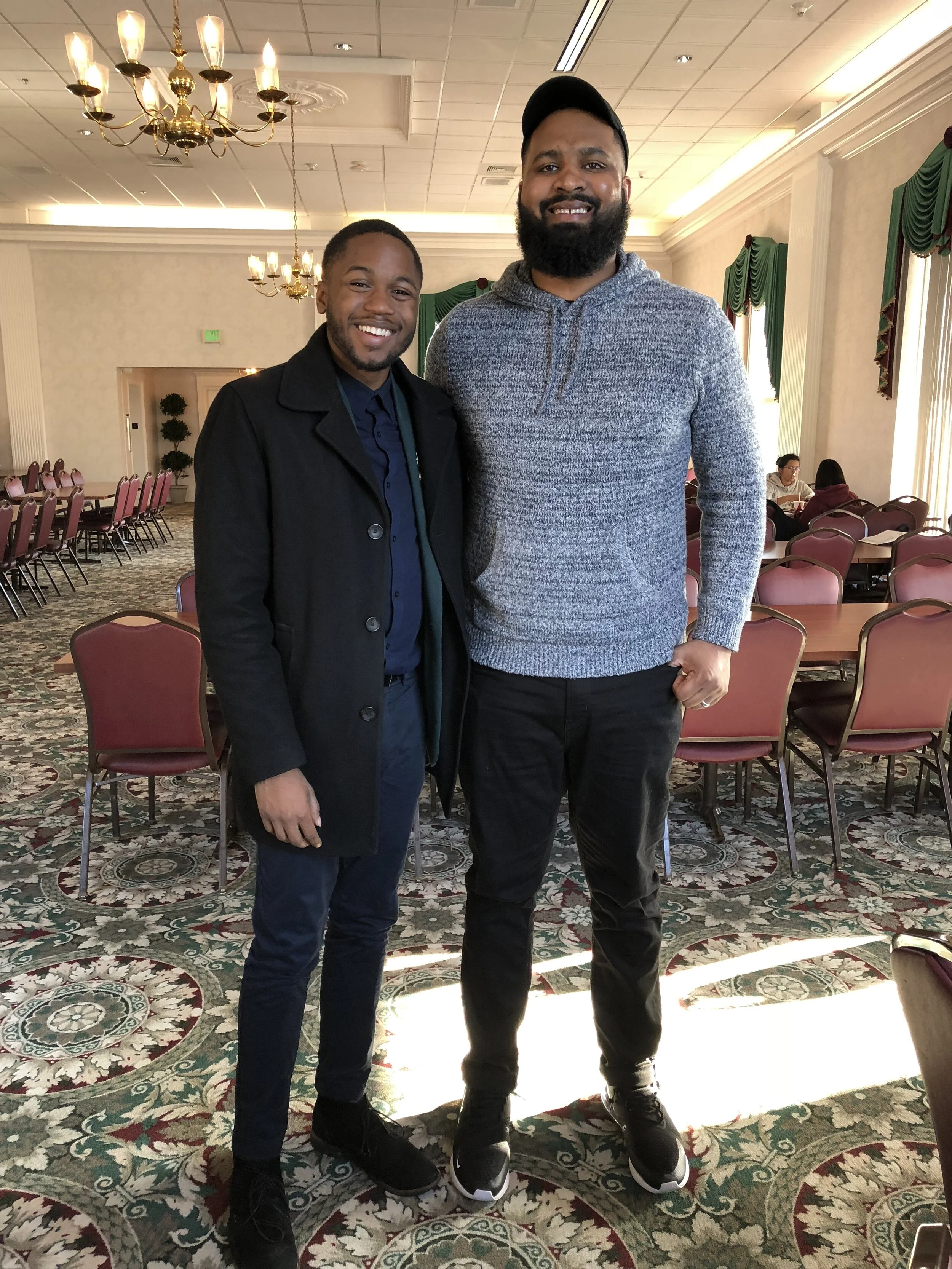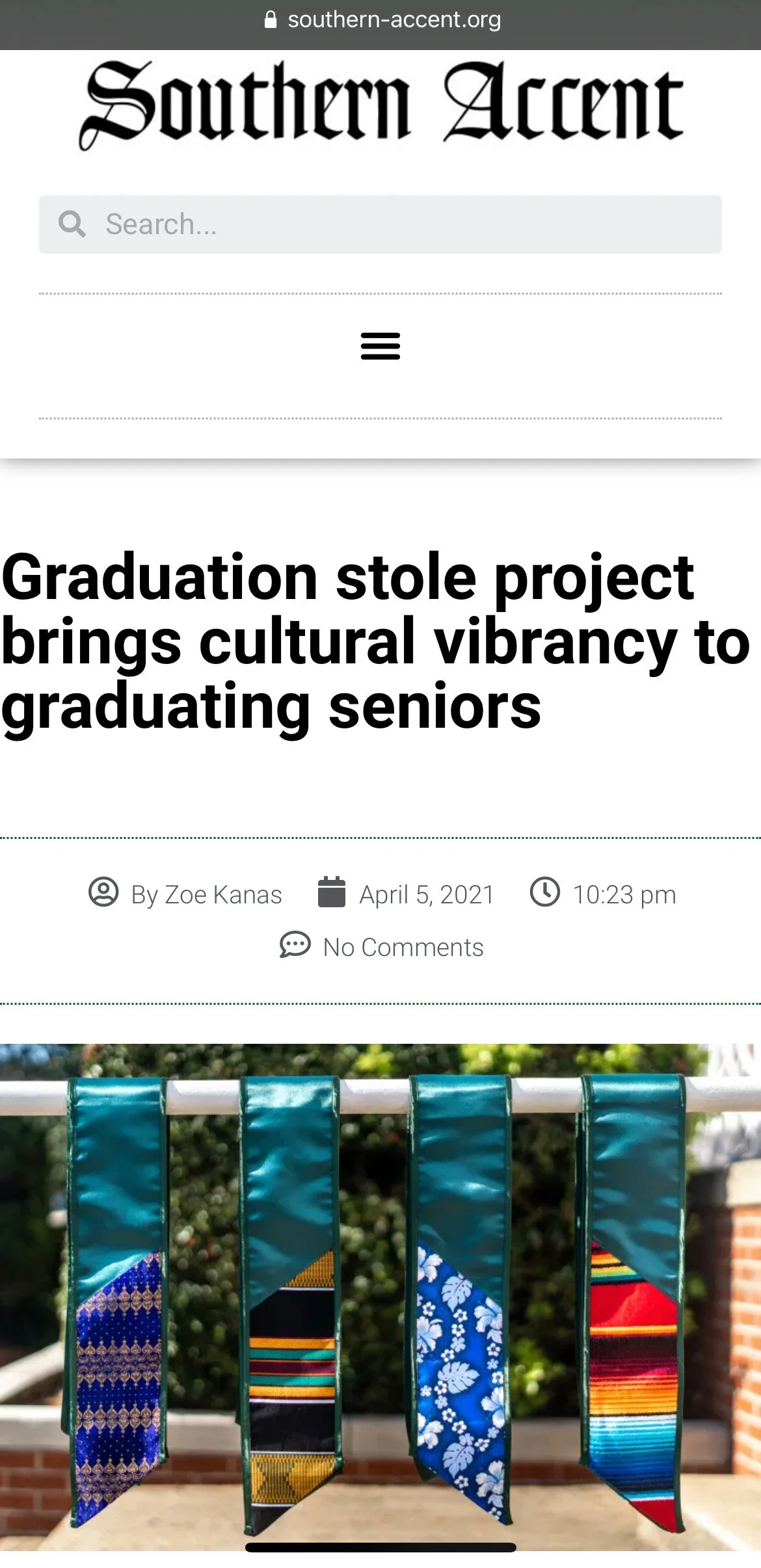The Heritage Stoles Project
A Graduation Proposal 2018-2019
“By creating and successfully implementing a Rite of Passage Ceremony and allowing the adornment of the Kente, Serape, and Asian/Pacific Islander stoles, Southern (Adventist University) can showcase their cultural diversity and provide minority students with an appropriate safe space to celebrate their accomplishments with each other, their families, and those who want to positively join them. Such stoles signify pride, cultural authenticity, dignity, the empowerment to succeed and the arduous obstacles that such students have had to overcome in the educational system to reach such an incredible milestone. There is no harm in allowing students to wear a sash that positively represents their cultural identity.”
The Story
After a year as Student Association President at Southern Adventist University, I realized that, among many opportunities, the institution was missing out on a potential gateway to celebrate heritage and culture at every institution’s most sacred of spaces: the graduation ceremony.
After watching Nia Darville, a student at Andrews University, create and implement a Rite of Passage Ceremony for the disbursement of the kente stoles (graduation stoles typically worn by Black and African American students), I was inspired to propose the very same project at Southern.
I also cannot forget how a petition for Kente stoles and decoration of graduation hats was proposed by another student in March-April 2018, Danielle Allen. If my project proposal was successful, I had hoped to have Danielle return and help host the celebration.
Mere months after the promise was made to hire a senior position for diversity and inclusion and with Southern being ranked second for ethnic diversity in Adventist higher education and tied for the most ethnically diverse university in the American South (according to US News and World Report), this project was created to highlight and celebrate the journeys of historically marginalized students on campus. Since no single people group held a majority on campus, the time was now. With no position of diversity in the summer of 2018, I took it upon myself to research, write, and propose this project in hopeful partnership with the university.
Summer-Fall 2018
Vice President of Diversity and Inclusion at Andrews University, Michael Nixon
I enlisted the help of Andrews University’s Vice President for Diversity and Inclusion, Michael Nixon, to fill me in on how the heritage stoles project worked at Andrews University and the accompanying rite of passage ceremony. Throughout the summer, I regularly called VP Nixon for support, as I knew that going about a project like this with no administrative backing could be extremely daunting.
I wrote the project and kept it a secret, hoping to launch the first portions of my plan for the Fall 2018 semester. The first order of business was to become the Senior Class President. This position, I had hoped, would grant me the opportunity to challenge Eurocentric notions at the graduation ceremony and implement new services to accommodate students of color.
It is important to note that these ceremonies would not interfere with the main graduation weekend, but they would function as a complement to the celebratory weekend.
I won the position, but was quickly informed that the graduation ceremony could not be altered, nor could stoles really be changed. Nevertheless, I brought my proposal to administration, who was already adamant that such a proposal may not be able to happen.
Spring 2019
An event was launched by the Senior Advisor for Diversity as a part of the S.O.A.R. (Solving Our Attitudes Racially) Initiative, called “The Amazing Race Competition.” The January 2019 competition was intended to inspire cross-cultural engagement and collaboration to propose a solution to racial barriers on campus. The Heritage Stoles Project was awarded third place. I didn’t totally lose out, however. The competition brought along two strong supporters of the project. I was no longer alone in my quest for celebrating heritage on campus.
Joining me on the Heritage Stoles Project was my longtime girlfriend of now-5 years, Natalia Perez-Gonzalez, and a mutual friend of ours for several years, Angelica Rodriguez, or Jelly for short. Throughout the semester, we were challenged to find a way to propose the Heritage Stoles Project to a mostly white senior administration. The project had already been researched, with evidence of the functionality of the project among several different Adventist institutions of higher learning, as well as high performing schools such as Harvard, Vanderbilt, Rutgers, Stanford, UC Berkeley, and Columbia. We figured that Southern should be next.
Together, Jelly and I brought our project to Student Association Senate, just to garner attention and support for the project. Many seemed supportive as we hoped to bring our project to the public. Before heavily marketing and telling the greater student body of the project, however, we wanted to gain support from administration.
It would prove no easy task.
I didn’t believe we were asking for much. We wanted a Rite of Passage Ceremony to be held at the Collegedale Seventh-day Adventist Church (University Church) on Friday, May 3rd, 2019 at 5pm. This ceremony would provide an example for all students in the future to form their ceremonies according to their specific cultures; for example, traditionally, Hispanic and Latin American students have held their own “La Raza Ceremony” as early as 1973. This first Rite of Passage ceremony, then, was to provide the blueprint for how the three major cultural groups on campus could celebrate throughout graduation weekend.
The Rite of Passage Ceremony would have been a program celebrating the accomplishments and highlighting students of color. This ceremony would have allowed students’ families and friends to positively celebrate in ways that the mainstream graduation ceremony would not. (The graduation ceremony, until May 2021, traditionally did not allow any noisemakers, cultural stoles, or any prolonged celebration for graduates). The Rite of Passage Ceremony would have acknowledged and empowered students for their sacrifices and pursuit of excellence. This ceremony would have brought context to each cultural stole.
Without the ceremony, the stoles are given without context.
So, in Spring 2019, Jelly, Natalia, and me proposed the Heritage Stoles project in hopes of celebrating culture in a major way on campus. Together, we hoped to partner with the prominent cultural clubs on campus (“The Big Three”: LAC, Latin American Club; BCU, Black Christian Union; Asian Club), to recruit students to be a part of the Rite of Passage ceremony and ensure the disbursement of the designated stoles (I had even thought of having those of Hispanic and Latin American descent, as well as Asian/Pacific Islander descent design their own stoles to ensure something representative of their own cultures).
We argued until we were blue in the face, hoping to change the minds of those in power. I’m especially thankful for Jelly and Natalia, who provided as much logic as they possibly could.
Unfortunately, we were met with: “What will the white students receive?”
And that was that.
I graduated, walking with my Kente stole underneath my regalia, where it would stay until the conclusion of the usual ceremony. I promised myself I would still get this project done, even after I was gone.
The project was then postponed, never seeing the light of day until Spring 2021.
Spring 2021
I woke up one morning in April 2021 and received word that after nearly three years since I’d written the Heritage Stoles Project, it was finally completed and graduates would wear their stoles for the May 2021 graduation.
I was happy for those students, but I felt blindsided. What changed the minds of senior administrators? Why wasn’t my team included on the project, even if we had graduated? Most importantly, what changed between 2019 to 2021? The pandemic has nothing to do with allowing cultural stoles, so was it the death of George Floyd and the ensuing Black Lives Matter Protests?
What changed?
And why was it that everywhere I looked, the students who worked so hard to write, research, and propose the project were absent from public memory?
And why was the Rite of Passage Ceremony mysteriously absent?
Even in a pandemic, schools are still offering different rite of passage ceremonies across their campuses. Why couldn’t my alma mater offer the same?
I’m glad to see that students have been able to enjoy the fruits of other students’ work of the past, but when will our institutions, as a whole, celebrate and include the history of those who worked hard to move our culture towards that of inclusion?
This is one of the many reasons why The Southern Project and my blog post exists. So often in collective Adventist racial history, the stories of those who worked hard to tear down walls of separation and bring about equity and inclusion have been lost to us. I’m passionate about making sure that such people are never forgotten, passed over, or rejected.
This work is back-breaking and exhausting, but I hope that all are encouraged to take on projects bigger than yourselves. You never know what kind of good you can do.
Thank you for hearing me.






